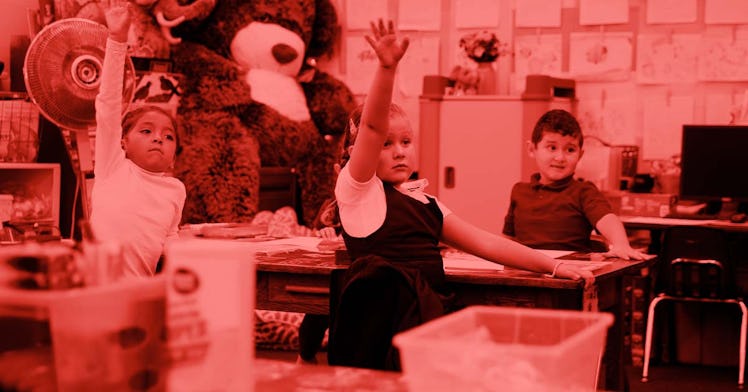Kindergarten Might Be a Mess This Fall Because of Pandemic Redshirting
This could be a kindergarten class like no other: large, disparately educated, and differently prepared for the challenges of school.

As vaccinations roll out and as schools inevitably reopen for full, in-person learning, parents who held their kids back from entering Zoom-based kindergarten in the midst of a pandemic may be sending their kids into one of the most diverse cohorts of kindergarten students yet, education experts predict.
Indeed, according to K-12 Dive, education experts predict what they refer to as a “kindergarten bubble,” a group of kids from 4 to 6 who are vastly differently prepared from one another when it comes formal schooling. This group will have a wider range of skills due to their different social and academic experiences during the COVID-19 educational year. This will be a doozy for teachers, kids, and parents.No one can blame parents for keeping their kids at home during the pandemic, for any number of reasons. COVID-19, a deadly virus that has killed more than 550,000 Americans, is a good enough reason alone — as is the reality that the typical, uber-tactile experience of kindergarten classrooms would be lost as many schools went to Zoom over playing with blocks together, leading many parents to decide to wait until things got back to “normal.”The rational, individual many parents made to keep their kids safe or wait for a fuller educational experience may have some collective consequences. Here’s what parents of kids entering pre-k and kindergarten might want to know about what kindergarten might look like for the 2021-2022 school year.
What Is The “Kindergarten Bubble”?
The “kindergarten bubble,” per the NWEA, is the group of current 4 to 6-year-olds who may be more — or way less — prepared for kindergarten compared to other years, due to the disruption in traditional in-person schooling. Many parents kept their kids in pre-kindergarten instead of putting their kids in remote kindergarten, or pulled them out and waited for the next school year, a process known as redshirting.
These kids who repeated pre-k or waited an extra year to enter kindergarten could have a wide range of skills or a lack of skills, depending on what their year looked like and what opportunities were afforded to them. Some kids could be advanced, having had tons of one on one time with tutors, and others could be at the starting line, less skilled than their peers. And more than anything, this class of kindergarten clouds could be big.Speaking to K-12 Dive, Beth Tarawasa, a researcher for the Northwest Evaluation Association, said, “This new kind of bubble… is likely to be a larger and more diverse class.”
Will It Be A Huge Deal?
How big of a deal it is, of course, depends on just how many parents decide to enroll their children in kindergarten this year — or if some still decide to hold back, as young children still don’t qualify for the vaccine and parents remain concerned about COVID.But, per K-12 Dive
and the National Institute for Early Education Research, state-funded pre-k programs declined by 15 to 41 percent in the pandemic year, and in many states, pre-k and kindergarten enrollment was down by single and double-digit percentage points. Nationally, kindergarten enrollment was down 16 percent for the 2020-2021 school year, per New America.
What Does it Mean for Kids and Teachers?
More students (in terms of sheer enrollment numbers) could enter kindergarten this year having had a variety of different educational experiences — for better or for worse.Given that kindergarten is one of the most important years of education for children, teachers will have to be nimble in responding to what is sure to be yet another anything but normal school year.New Americarecommends that schools hire assistant teachers for kindergarten classrooms due to the potential for disparate educational starting points among kids, expand summer learning opportunities for kids about to enter kindergarten, offer tutoring for kindergarten students, coach and train teachers to utilize evidence-based curricula, and consider transitional kindergarten, otherwise known as a two-year kindergarten program for children that helps children’s early skills grow dramatically.
Extra investment in kids who may not be as advanced at the moment will help them be more prepared for more advanced grades and help kids learn after a strange, hard year.
This article was originally published on